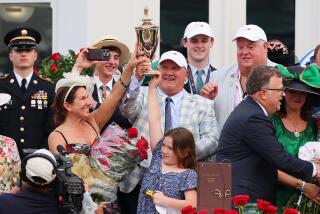Colt Is Not Flashy, but Has a Big Punch
- Share via
If A.P. Indy were a prizefighter, his nickname would be Rocky. He would be said to have what the fight mob calls “a puncher’s chance.” In football, he would be a tight end.
Translation: He is not very nifty. No great moves. Not too stylish. He doesn’t dazzle you with footwork. You wouldn’t call him “Sugar.”
He needs everything to be set up right for him to land the right. Don’t confuse him. He is not a clincher.
He also would be known as a “fighter who can take it.” You get the feeling he would get off the floor a few times if he had to. He might finish with a cut lip, a black eye and this ringing in his ears--but he would keep coming.
He doesn’t have this great speed--or turn of foot. You need something to coax a performance out of him. A rabbit out there on the front end, a pretty good pace to squeeze the run out of the pacesetters.
He is a plodder, a stalker. He goes after that lead horse like Scotland Yard on the tail of a serial killer. He is relentless. When you hit the stretch, if you hear footsteps, they are A.P. Indy’s.
But is he another Swaps? Affirmed? Even Sunday Silence? Will he be one of the handful of runners who parlayed the Santa Anita Derby into the Kentucky Derby or even a Triple Crown?
He had everything his own way in the 55th running of the Santa Anita Derby on Saturday. Out on the front end were two horses trying to kill each other off, the no-chance Hickman Creek and the good, game Bertrando. The upstart Northern California runner, Casual Lies, joined them in the backstretch.
The fractions weren’t blistering. It was hardly a scorched-earth policy. But 22 2/5 seconds for the quarter and 46 1/5 for the half on a track that was officially fast but unofficially holding at the bottom burned up a lot of fuel. And you can’t pit in a Derby. If you’re running on empty, you finish on empty.
A.P. Indy had plenty left in the tank at the wire.
A.P. Indy is also patient. Or, at least his rider, Eddie Delahoussaye, is.
Delahoussaye knew he had a long-striding colt who needed, so to speak, a lot of punching room. He took him on the scenic route. He ran the confident race of a guy who knew he could win even if he had to surround the field first.
A.P. Indy is what the tracksters call a “low-headed horse.” He runs like a guy who is looking for his contact lenses or discarded winning mutuel tickets. What they call around the track a “stooper.” He looks a little as if he meant to go into a somersault momentarily.
His running style runs more to grimly determined than brilliant. “He doesn’t have that instant acceleration,” acknowledged his trainer, Neil Drysdale. “He needs clearance,” Delahoussaye said.
He also needs discipline. A.P. Indy can act as if he expected to inherit the race, rather than try to win it, and Delahoussaye alternately had to hit him with or show him the whip. Still, he kept his field in sight, then reeled them in when he had to--just in time, as it happens. He did not open any margin until within a few jumps of the finish.
His margin was not impressive--a length and three-quarters. Sunday Silence won this race by 11 on the way to his Kentucky Derby victory in 1989. Affirmed won this race by eight on his way to his Triple Crown in 1978.
A.P. Indy’s time was not impressive. One-forty-nine and one is not slow freight time, but it’s not going to scare the hardboots of Kentucky.
All in all, the race of Bertrando, who took off from post position 1, got the lead, then staved off repeated challenges from, first, Hickman Creek, then, Casual Lies, and was still trying to fight off the winner until within eyeshot of the finish line, was a study in stubborn courage.
But good, game races don’t count. A.P. Indy is the West’s best. He might need running room, he might need speed horses on the front end to set an unrealistic pace, he might never make the world forget Man o’ War or even Affirmed. But once he gets his man on the ropes, it’s over. He will take a lot of beating at Churchill.
He is a typical product of late 20th-Century America--Japanese-owned. If he wins at Louisville on May 2, the Japanese will have added the Kentucky Derby to their impressive list of sport trophies, which already includes Pebble Beach, Riviera and the Seattle Mariners.
He cost Mr. Tomonori Tsurumaki $2.9 million, which is a lot of yen, but not much to pay for a Kentucky Derby when you consider the money the Vanderbilts, Whitneys, Galbreaths and Guggenheims spent to win this race.
The toast of Paris, Arazi, might succeed in his camp’s daring plan to win this race at Churchill Downs the first Saturday in May, but if he hesitates, loafs or lags--or lugs--in the stretch that day, those footsteps he hears will be A.P. Indy’s. He saves his race for the wire--but usually that is soon enough.
More to Read
Go beyond the scoreboard
Get the latest on L.A.'s teams in the daily Sports Report newsletter.
You may occasionally receive promotional content from the Los Angeles Times.










